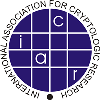Call for papers
Original papers on practical and theoretical aspects of cryptology are solicited for submission to Eurocrypt 2017, the 36th Annual Eurocrypt Conference. Eurocrypt 2017 is organized by the International Association for Cryptologic Research (IACR).Instructions for Authors
Submissions must be at most 30 pages using Springer's LNCS format, excluding any supplementary material (formerly known as appendices). Optionally any amount of clearly marked supplementary material may be supplied, following after the main body of the paper or in separate files (for example, program code or experimental data). Details on the Springer LNCS format can be obtained via http://www.springer.de/comp/lncs/authors.html. For accepted papers the length of the final version for Springer's LNCS will be at most 30 pages including title page, abstract, references and appendices, in the llncs class format.
It is encouraged that the submission be processed in LaTeX2e according to the instructions listed on Springer. These instructions are mandatory for the final, camera-ready versions. Submitted papers must be in PDF format and submitted electronically via the submission server. The list of authors should include all those, and only those, who have contributed to the submission. Submission deadline: October 1st, 2016, 10:00 UTC.
The submission must be anonymous with no author names, affiliations or obvious references. It should begin with a title, a short abstract, and an introduction. The introduction should summarize the contributions of the paper at the level understandable for a non-expert reader. The submission should be intelligible without the supplementary material, as reviewers are not required to access the supplementary material. Please submit a file with page numbering.
Submissions must not substantially duplicate work that any of the authors has published in a journal or a conference/workshop with proceedings, or has submitted/is planning to submit before the author notification deadline to a journal or other conferences/workshops that have proceedings. Accepted submissions may not appear in any other conference or workshop that has proceedings. IACR reserves the right to share information about submissions with other program committees to detect parallel submissions and the IACR policy on irregular submissions will be strictly enforced. For further details, see http://www.iacr.org/docs/.
Submissions not meeting these guidelines may be rejected without consideration of their merits. In particular, the Springer LNCS format must be used without changing margins or font sizes.
Program committee members are allowed to submit one paper, and a second one if both submissions are co-authored. Any PC member submission will be held to higher standards than other submissions. Program chairs are not allowed to submit.
Schedule
We will run a two stage reviewing process, i.e. the committee will issue rejections for some papers after round one in case we do not see any support for a revision through a rebuttal, and will invite authors of papers that make it into round two to write rebuttals. These rebuttals will be then taken into account for the second discussion phase and the decision.
The schedule is as follows:
- Submission deadline: October 1st, 2016 (10:00 UTC)
- First round notification: December 3rd, 2016
- Rebuttals due: December 8th, 2015
- Final notifications of acceptance or rejection: January 18th, 2017
- Final version due: February 14th, 2017
Conference Proceedings
Proceedings will be published in Springer's Lecture Notes in Computer Science and will be available at the conference. Authors of accepted papers must complete the IACR copyright assignment form for their work to be published in the proceedings, and guarantee that their paper will be presented at the conference. The final versions of the accepted papers will be due on February 14th, 2017.
Program Committee
Gilad Asharov (IBM T.J. Watson Research Center, USA)
Nuttapong Attrapadung (AIST, Japan)
Fabrice Benhamouda (ENS, France and IBM T.J. Watson Research Center, USA)
Nir Bitansky (MIT, USA)
Andrey Bogdanov (Technical University of Denmark)
Alexandra Boldyreva (Georgia Institute of Technology, USA)
Chris Brzuska (TU Hamburg, Germany)
Melissa Chase (Microsoft Research)
Jean-Sébastien Coron (University of Luxembourg), Co-Chair
Itai Dinur (Ben-Gurion University, Israel)
Léo Ducas (CWI, Amsterdam, Netherlands)
Stefan Dziembowski (University of Warsaw, Poland)
Nicolas Gama (Inpher, Switzerland and University of Versailles, France)
Pierrick Gaudry (CNRS, France)
Peter Gazi (IST Austria, Austria)
Niv Gilboa (Ben-Gurion University, Israel)
Robert Granger (EPFL, Switzerland)
Nathan Keller (Bar Ilan University, Israel)
Aggelos Kiayias (University of Edinburgh, UK)
Eike Kiltz (Ruhr-University Bochum, Germany)
Vladimir Kolesnikov (Bell Labs, USA)
Ranjit Kumaresan (MIT, USA)
Eyal Kushilevitz (Technion, Israel)
Gregor Leander (Ruhr-University Bochum, Germany)
Tancrède Lepoint (SRI International, USA)
Benoît Libert (CNRS and ENS de Lyon, France)
San Ling (Nanyang Technological University, Singapore)
Anna Lysyanskaya (Brown University, USA)
Tal Malkin (Columbia University, USA)
Willi Meier (FHNW, Switzerland)
Florian Mendel (Graz University of Technology, Austria)
Bart Mennink (KU Leuven, Belgium)
Ilya Mironov (Google, USA)
María Naya-Plasencia (INRIA, France)
Jesper Buus Nielsen (Aarhus University, Denmark), Co-Chair
Ivica Nikolić (Nanyang Technological University, Singapore)
Miyako Ohkubo (NICT, Japan)
Rafail Ostrovsky (UCLA, USA)
Omkant Pandey (Stony Brook University, USA)
Omer Paneth (Boston University, USA)
Chris Peikert (University of Michigan, USA)
Thomas Peters (UCL, Belgium)
Krzysztof Pietrzak (IST Austria, Austria)
Emmanuel Prouff (Safran Identity & Security, France)
Leonid Reyzin (Boston University, USA)
Louis Salvail (University of Montreal, Canada)
Yu Sasaki (NTT Secure Platform Laboratories, Japan)
Abhi Shelat (Northeastern University, USA)
Elaine Shi (Cornell University, USA)
Martijn Stam (University of Bristol, UK)
Damien Stehlé (ENS de Lyon, France)
John P. Steinberger (Tsinghua University, China)
Ingrid Verbauwhede (KU Leuven, Belgium)
Brent Waters (University of Texas, USA)
Daniel Wichs (Northeastern University, USA)
Mark Zhandry (Princeton University, USA)
